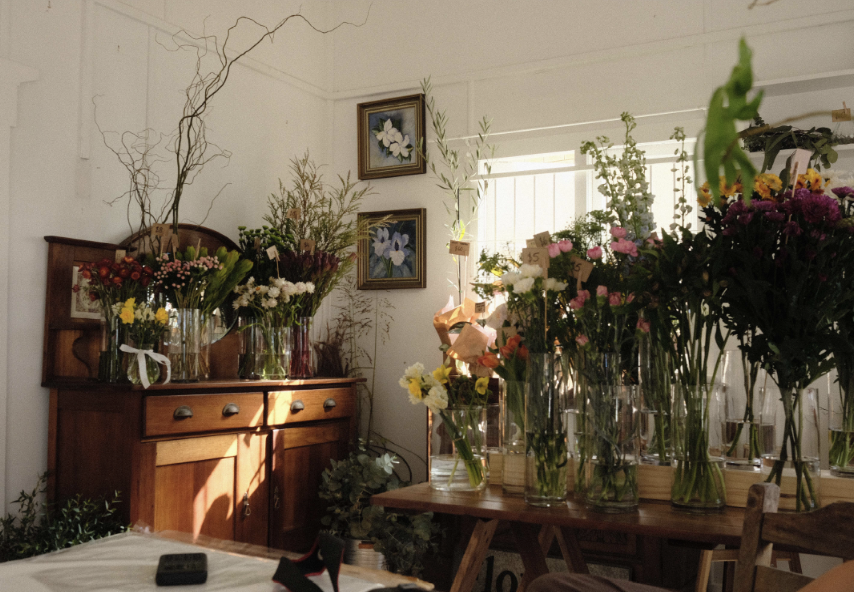Who’s Behind Your Threads
Words Libby Kilby
To focus your business on sustainability, first you have to be aware of the issues at hand: mass and over production, non-ethical standards, and lack of transparency in supply chains. Fast fashion and overconsumption are known for its damaging environmental impact and exploitative practices, including poor working conditions, low pay and forced labour.
Previously, we would have seasons of clothes, time to make a choice, be it personal or weather based. Yet, with the birth of brands such as Zara and Shein, we are seeing a new line of clothing almost every week. The availability of a never ending supply of cheaply made clothes, allows for the over consumption of bright new things, and inevitable additions to landfill when these clothes quickly fall apart.
While conscious consumer choices start at the top – with businesses that offer alternatives – it’s not as easy as it sounds. Due to our geographical location and minimum wage laws to protect workers from being exploited, it is more expensive to manufacture goods in Australia. Not every industry or owner has the business model to withstand the additional costs. That is why so many items we find on our shelves are made offshore.
However, businesses that wish to succeed and have a competitive edge, now face increased pressure from the public to take an active role in balancing profit with societal responsibility. Catering not only to shareholders, but to all stakeholders, such as: employees, suppliers, local communities, eco systems and even future generations.
Plenty of companies are willing to be completely dishonest with this kind of business model. Words like ‘greenwashing’ and ‘pinkwashing’ are all too familiar. There’s no shortage of companies willing to use these words of social justice, and ecological sustainability, to make a quick buck without changing awful practices. Whether it’s a little green sticker that doesn’t mean anything or a promise to be carbon neutral in fifty years, they fail to change their processes, placing the onus of responsibility on the consumer to assess the company’s practices before committing to a purchase.
Thankfully, there are many businesses that now prioritise ethical consumerism and sustainability, such as Bilboa, The Sewloist, Genkstasy, House of Clare & Alice Nightingale. Each know that while it is a challenging journey for their business, they are seeking to end inhumane working conditions of overseas production lines, the disastrous impact on our environment, and to enable the customer to know where their purchase comes from. They believe small things make a difference, and they continue to contribute their energy and integrity to generating long-term benefits for their customers.
Watching the documentary ‘The True Cost’ by Andrew Morgan helped open my eyes to the global issue which effects more people and countries than most would realise.
Now, while I am hardly a trailblazer of the ethical and sustainability movement (a few of my own wardrobe items were manufactured in sweatshops) I am fortunate to know and work alongside artists, makers and designers who live and breathe the values of sustainable practices, and to live in a region so full of revolutionary small businesses. These makers and artists go the extra mile to produce their products ethically, to ensure they’re affecting the environment and communities in a positive, mindful way.
It seems a simple idea, a way to increase happiness and love, is to buy well-made quality clothing or wares, whose longevity far exceeds those from fast fashion labels. The value in knowing where your garment or product is made, the stories behind it, and the name of the maker, allows for memories to grow.
With this in mind, as I reflect on the importance of making small and achievable changes in my own life which honour the values of ethics and sustainability, these are the top five ideas I will be seeking to live by:
Buy local and support small businesses wherever possible. This includes fresh produce, flowers, clothing, accessories, gifts and skincare. With so many businesses now available, the sky is the limit!
Research the brands I am tempted to buy from on social media and unfollow the fashion brand accounts that don’t have a strong sustainability policy.
Be patient and intentional with my purchases. Give it a second thought, for example, ‘do I really need a fourth pair of ripped jeans?’
Stay focused. Make a list of the purchases I wish to make, so that when I’m shopping I can check that item off the list. And then care for that item better and for longer.
Buy vintage and second hand items wherever possible. Dig out my old items of clothing which – due to tiramisu – I don’t quite fit into anymore. Look at either on selling or altering them to fit once again.
The aim of this article is not to preach, but to allow for a moment of second thought, of choice. To understand that there are people out there with the same goals of sustainability and values as you. If everybody makes one better choice, buys from a local business, the impact on not just the business, but yourself, will be greatly felt.
Libby Kilby is the founder of Kingy Collective on Marine Parade in Kingscliff. Kingy Collective focuses on slow fashion, artisan, and ethical products, including clothing, jewellery, skincare, homewares, and more, plus fresh flowers from Tweed Valley Flowers and handmade burgers by Burgerlesque.


